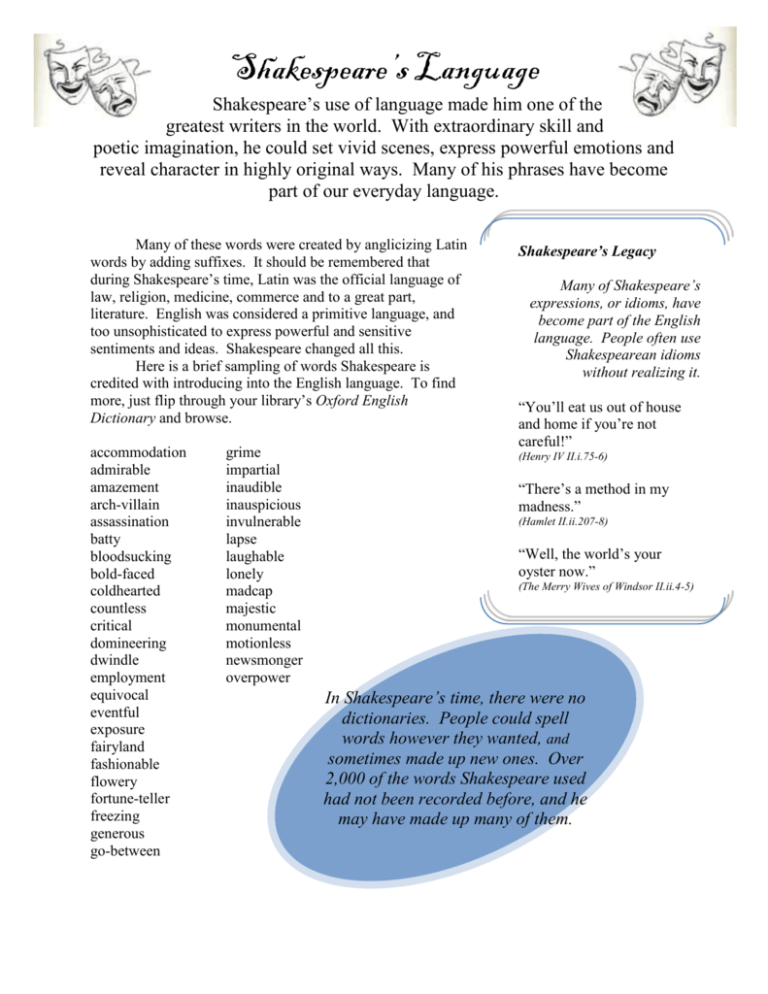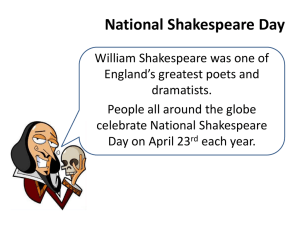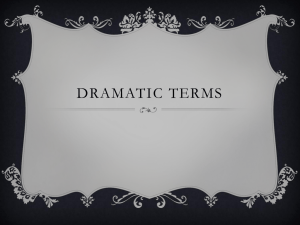Shakespeare`s Language
advertisement

Shakespeare’s Language Shakespeare’s use of language made him one of the greatest writers in the world. With extraordinary skill and poetic imagination, he could set vivid scenes, express powerful emotions and reveal character in highly original ways. Many of his phrases have become part of our everyday language. Many of these words were created by anglicizing Latin words by adding suffixes. It should be remembered that during Shakespeare’s time, Latin was the official language of law, religion, medicine, commerce and to a great part, literature. English was considered a primitive language, and too unsophisticated to express powerful and sensitive sentiments and ideas. Shakespeare changed all this. Here is a brief sampling of words Shakespeare is credited with introducing into the English language. To find more, just flip through your library’s Oxford English Dictionary and browse. Shakespeare’s Legacy accommodation admirable amazement arch-villain assassination batty bloodsucking bold-faced coldhearted countless critical domineering dwindle employment equivocal eventful exposure fairyland fashionable flowery fortune-teller freezing generous go-between (Henry IV II.i.75-6) grime impartial inaudible inauspicious invulnerable lapse laughable lonely madcap majestic monumental motionless newsmonger overpower Many of Shakespeare’s expressions, or idioms, have become part of the English language. People often use Shakespearean idioms without realizing it. “You’ll eat us out of house and home if you’re not careful!” “There’s a method in my madness.” (Hamlet II.ii.207-8) “Well, the world’s your oyster now.” (The Merry Wives of Windsor II.ii.4-5) In Shakespeare’s time, there were no dictionaries. People could spell words however they wanted, and sometimes made up new ones. Over 2,000 of the words Shakespeare used had not been recorded before, and he may have made up many of them. Some Useful Shakespearean Language alack an anon as life beget beguile belike brook chamber cunning desist didst thou? dost thou? fare ye well luck fie gramercies hark hence hither how now? idle i’faith importune iwis joy marry meet prithee raiment sawst thou? sirrah tarry thee, thou thy ‘tis ‘twas unto want wench wilt thou? Often, letters are omitted in words for the sake of the sound of poetry. - alas, woe - if Some examples: - at once, soon - rather - bring forth - charm, trick - probably - endure, suffer - room - clever - stop - did you? - do you? - farewell, good-bye, good - shame - many thanks - listen - from here - to this place - what’s happening? - foolish - in faith, really, truly - beg - certainly - rejoice - truly, by the Virgin Mary - suitable, appropriate - I pray you, please - clothes, clothing - did you see? - Hey, you there? (usually used to address servants) (accent on the first syllable) - delay, be late, wait - you - your - it is - it was - to - lack - woman - will you? ‘tis = it is thou’st = thou art ne’er = never o’er = over o’ = of i’ = in ‘t = it ta’en = taken Elizabethan language contains many old verb forms that are no longer used today. Examples: thou art – you are thou dat – do you thou know’st – you know thou see’st – you see thou did’st – you did he hath – he has he doth – he does Rhythm in Shakespeare’s Plays Shakespeare’s work is poetry in action! Since rhythm is perhaps the most basic element of sound in a poem, and meter the most basic element of rhythm, we must discuss meter and other related terms. Meter: A term used to describe the underlying rhythm of a poem, based on the number and the placement of stressed syllables in each line. Stressed or Unstressed Syllables: Stress basically applies to the word, or the syllable involved in a word that is given greater emphasis by our voice. i.e. human = hU-man OR hu-mAne i.e. Is SHE walking? OR IS she walking? The number of stresses in a line of poetry, therefore, is the number of syllables on which our voice naturally tends to put a stronger emphasis. The lines of Shakespeare’s plays are unrhymed and are all ten syllables long. The syllables have alternating stresses (an unstressed syllable followed by a stressed one). U / = iamb U / U / U/ U / U/ i.e. “Two households, both alike in dignity” (Romeo and Juliet, Prologue, 1) There are five feet (groups) of iambs. This pattern is technically called iambic pentameter. Various Patterns iamb = phyrric = spondee = trochee = anapest = caesura = U/ UU // /U UU/ || (a pause) Line Lengths dimeter – two feet per line trimeter – three feet per line tetrameter – four feet per line pentameter – five feet per line hexameter – six feet per line I want you to enjoy your experience with the Shakespearean play Othello. During Shakespeare’s day, Londoners were in love with words and language. To truly appreciate and share their love, you must understand what on earth they are saying! Here are a few things to keep in mind when reading: Read by punctuation, not by line ending. The end of the line is not necessarily the end of a sentence. Remember, much of the play is written as poetry! Ex. My noble father, I do perceive here a divided duty. To you I am bound for life and education. My life and education both do learn me How to respect you. You are the lord of my duty, I am hitherto your daughter. But here’s my husband, And so much duty as my mother showed To you, preferring you before her father, So much I challenge that I may profess Due to the Moor my lord. (Othello, 1.3.179–188) Read slowly, remembering that poetry is compressed and therefore ideas are expressed in the fewest words possible. Thus, each word counts. While reading pick out the words that are familiar to you and use them to help you figure out the rest. Shakespeare uses a lot of images and symbols therefore you will need to use your imagination to help you understand what emotions or ideas he is referring to. Additionally, by using your imagination you will be like Shakespeare’s original audience! Picturing the person or events that are being described will help bring the play “to life” for you. Practice makes perfect… Shakespeare’s Unusual Arrangement of Words The way Shakespeare put his words together can be confusing, because we depend on the position of words in a sentence or phrase to guide us in our understanding of what is being said. Rearrange the following words (taken from Othello) in the order you would probably use them in ordinary conversation: 1. “I will wear my heart upon my sleeve for daws to peck at; I am not what I am." (1.1.64-65) ______________________________________________________ 2. "To mourn a mischief that is past and gone is the next way to draw new mischief on.” (1.3.204-205) ______________________________________________________ 3. “Reputation is an idle and most false imposition; oft got without merit, and lost without deserving.” (2.3. ) ______________________________________________________







